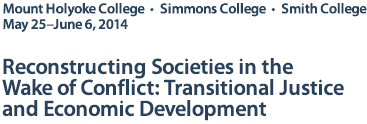The Institute Ends, but the Work Continues
A WPSP Institute closing gala dinner on June 5 at Smith College honored delegates and heralded lasting connection and support for their ongoing efforts
By Jane Falla
“We celebrate you tonight and we savor this magical moment.” With those words, Rangita de Silva de Alwis, director of the WPSP, launched the commencement ceremony honoring the 48 delegates of the WPSP Institute co-hosted by Mount Holyoke, Simmons and Smith colleges.
Smith Provost and Dean of the Faculty Marilyn Schuster, WPSP Director Rangita de Silva de Alwis, Harvard Resident Fellow Farah Pandith (Smith ’90) and Mount Holyoke President Lynn Pasquerella (Mount Holyoke ’80) joined international delegates at a gala dinner, all sharing a powerful message: We are in this together, and we will continue to be with you in a worldwide network of support.
“The WPSP is your platform, a place where your voice will be amplified … and where we will keep you engaged with what is happening around the world,” de Silva de Alwis advised. She mentioned new WPSP support services, including mentoring programs, pro bono law assistance and new avenues for delegates to stay connected. “We will not forget your stories.”
In a room filled with warm celebration and camaraderie, Pasquerella referred to educator and author Martha Nussbaum, sharing her concepts of compassionate and inclusive global citizenship. “The WPSP reflects a deep commitment to acting globally,” said Pasquerella. She described the transformative power of women’s leadership as being foregrounded by a circle—a link that will not be broken when the delegates return home.
Pandith reiterated the WPSP’s commitment to showing the world that women’s voices are vital to shaping policies—not just on so-called “women’s issues,” but on everything from climate change to immigration to transportation to terrorism.She emphasized that giving dignity to all voices is essential, not just because it’s the honorable thing to do, but because diverse voices are a valuable tool.
Delegates Irene Nakasolya from Uganda, Miral Omran from Egypt, Jennifer Liang from India and Chanda Thapa from Nepal expressed their gratitude and reflected on their many experiences during the Institute. Said Omran, “I am going home with more questions than answers, and the more questions I have, the more confident I am that I’m on the right track.”
Nakasolya said the delegates are even more determined to effect change. “We are leaving this place energized to do more and achieve more, and we are going to do a lot to change what we call the second sex in our countries.”
Jennifer Liang from India garnered laughs and applause while sharing memories of trying to adjust to the New England cold, dealing with culture shock, and feeling the joyful connection among delegates and the people who made the Institute possible. “Having a sisterhood with whom we can share experiences will be very valuable for us.”
Armed with this support—along with hope—Liang said the delegates feel empowered to confront the monumental work that lies ahead. “I’m sure with a little help from our friends we will do it.”


